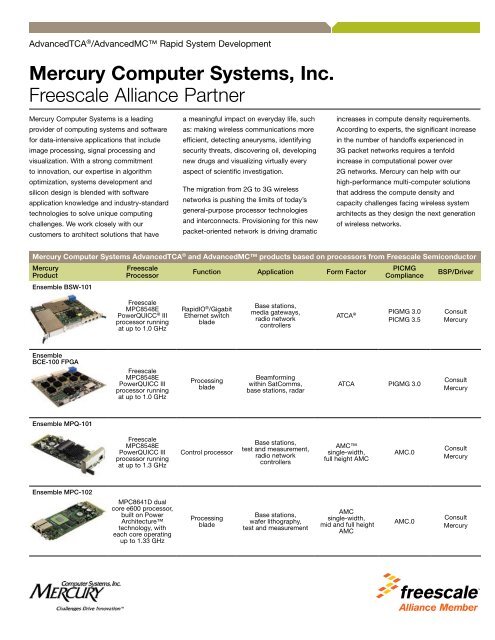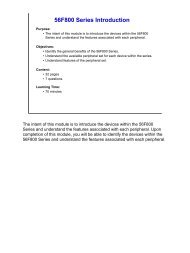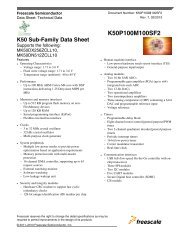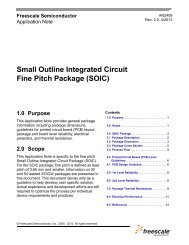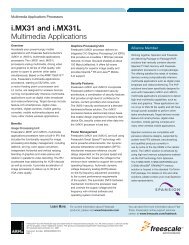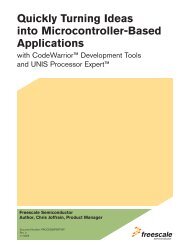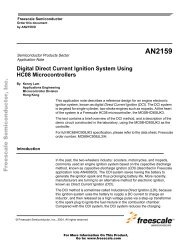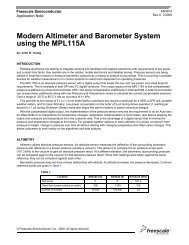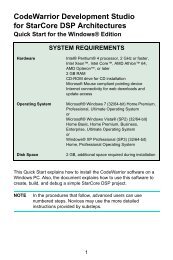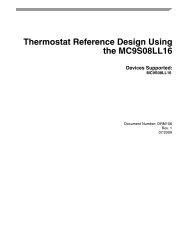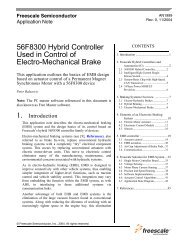Mercury Computer Systems, Inc. Freescale Alliance Partner
Mercury Computer Systems, Inc. Freescale Alliance Partner
Mercury Computer Systems, Inc. Freescale Alliance Partner
You also want an ePaper? Increase the reach of your titles
YUMPU automatically turns print PDFs into web optimized ePapers that Google loves.
AdvancedTCA ® /AdvancedMC Rapid System Development<br />
<strong>Mercury</strong> <strong>Computer</strong> <strong>Systems</strong>, <strong>Inc</strong>.<br />
<strong>Freescale</strong> <strong>Alliance</strong> <strong>Partner</strong><br />
<strong>Mercury</strong> <strong>Computer</strong> <strong>Systems</strong> is a leading<br />
provider of computing systems and software<br />
for data-intensive applications that include<br />
image processing, signal processing and<br />
visualization. With a strong commitment<br />
to innovation, our expertise in algorithm<br />
optimization, systems development and<br />
silicon design is blended with software<br />
application knowledge and industry-standard<br />
technologies to solve unique computing<br />
challenges. We work closely with our<br />
customers to architect solutions that have<br />
a meaningful impact on everyday life, such<br />
as: making wireless communications more<br />
efficient, detecting aneurysms, identifying<br />
security threats, discovering oil, developing<br />
new drugs and visualizing virtually every<br />
aspect of scientific investigation.<br />
The migration from 2G to 3G wireless<br />
networks is pushing the limits of today’s<br />
general-purpose processor technologies<br />
and interconnects. Provisioning for this new<br />
packet-oriented network is driving dramatic<br />
increases in compute density requirements.<br />
According to experts, the significant increase<br />
in the number of handoffs experienced in<br />
3G packet networks requires a tenfold<br />
increase in computational power over<br />
2G networks. <strong>Mercury</strong> can help with our<br />
high-performance multi-computer solutions<br />
that address the compute density and<br />
capacity challenges facing wireless system<br />
architects as they design the next generation<br />
of wireless networks.<br />
<strong>Mercury</strong> <strong>Computer</strong> <strong>Systems</strong> AdvancedTCA ® and AdvancedMC products based on processors from <strong>Freescale</strong> Semiconductor<br />
<strong>Mercury</strong><br />
Product<br />
Ensemble BSW-101<br />
<strong>Freescale</strong><br />
Processor<br />
Function Application Form Factor<br />
PICMG<br />
Compliance<br />
BSP/Driver<br />
<strong>Freescale</strong><br />
MPC8548E<br />
PowerQUICC ® III<br />
processor running<br />
at up to 1.0 GHz<br />
RapidIO ® /Gigabit<br />
Ethernet switch<br />
blade<br />
Base stations,<br />
media gateways,<br />
radio network<br />
controllers<br />
ATCA ® PIGMG 3.0<br />
PICMG 3.5<br />
Consult<br />
<strong>Mercury</strong><br />
Ensemble<br />
BCE-100 FPGA<br />
<strong>Freescale</strong><br />
MPC8548E<br />
PowerQUICC III<br />
processor running<br />
at up to 1.0 GHz<br />
Processing<br />
blade<br />
Beamforming<br />
within SatComms,<br />
base stations, radar<br />
ATCA PIGMG 3.0<br />
Consult<br />
<strong>Mercury</strong><br />
Ensemble MPQ-101<br />
<strong>Freescale</strong><br />
MPC8548E<br />
PowerQUICC III<br />
processor running<br />
at up to 1.3 GHz<br />
Control processor<br />
Base stations,<br />
test and measurement,<br />
radio network<br />
controllers<br />
AMC<br />
single-width,<br />
full height AMC<br />
AMC.0<br />
Consult<br />
<strong>Mercury</strong><br />
Ensemble MPC-102<br />
MPC8641D dual<br />
core e600 processor,<br />
built on Power<br />
Architecture<br />
technology, with<br />
each core operating<br />
up to 1.33 GHz<br />
Processing<br />
blade<br />
Base stations,<br />
wafer lithography,<br />
test and measurement<br />
AMC<br />
single-width,<br />
mid and full height<br />
AMC<br />
AMC.0<br />
Consult<br />
<strong>Mercury</strong>
Ensemble BSW-101<br />
RapidIO ® /Gigabit Ethernet switch blade<br />
• <strong>Freescale</strong> MPC8548E PowerQUICC ® III<br />
communication processor at up to 1.0 GHz<br />
• 4 x Serial RapidIO ® fabric interface<br />
• Fabric interface:<br />
Fifteen 1 x/4 x Serial RapidIO links<br />
Base interface—sixteen 1000Base-T<br />
Ethernet ports<br />
Control interface IPMB-A and<br />
IPMB-B links<br />
• 23 channels of Gigabit Ethernet (GbE)<br />
via GbE switch<br />
• 18-Port Serial RapidIO on-board<br />
non-blocking switching network<br />
• Inter-chassis Ethernet and<br />
RapidIO communications via<br />
AdvancedMC (AMC) module<br />
Ensemble BCE-100 FPGA<br />
Compute blade<br />
• <strong>Freescale</strong> MPC8548E PowerQUICC III<br />
communication processor at up to 1.0 GHz<br />
• 9 x on-board FPGAs (Xilinx ® Virtex-4s)<br />
• Fabric interface:<br />
Eleven fabric 4 x channels at<br />
3.125 Gbaud<br />
Fabric endpoints implemented within<br />
the FX60/100 FPGAs<br />
Ensemble MPQ-101<br />
Control processor<br />
• <strong>Freescale</strong> MPC8548E PowerQUICC III<br />
processor at up to 1.3 GHz<br />
• 512 MB DDR2 SDRAM<br />
• 128 MB flash memory<br />
• 1000Base-X fiber SerDes interface over<br />
copper link Ethernet (Port 0)<br />
• Zone 3 interface:<br />
Ten 4 x fabric channels at 3.125 Gbaud<br />
Fabric endpoints implemented within<br />
the FX60/100 FPGAs<br />
• Supports up to a 12-slot configuration<br />
• IPMI peripheral manager<br />
• 1 x/4 x Serial RapidIO (Ports 4–7)<br />
• Front-panel USB and GbE connector<br />
• IPMI controller, firmware and IMPB links<br />
• Linux ® OS support<br />
Ensemble MPC-102<br />
Compute bade<br />
• <strong>Freescale</strong> MPC8641D dual core processor,<br />
based on Power Architecture technology,<br />
at up to 1.33 GHz<br />
• Up to 2 GB DDR2 SDRAM<br />
• 128 MB NOR flash memory<br />
• Switch-fabric options:<br />
1 x/4 x Serial RapidIO: AMC fat pipe<br />
Ports 4–7<br />
8 x, 4 x, 2 x, 1 x PCI Express ® :<br />
AMC fat pipe Ports 8–11 and 4–7,<br />
not AMC.1 compliant<br />
• Dual 1000Base-BX Ethernet connections:<br />
AMC common option Ports 0–1<br />
• Serial ATA (SATA) connection: AMC<br />
common option Port 2<br />
Learn More:<br />
For more information about <strong>Freescale</strong>’s<br />
ATCA/AMC reference designs and <strong>Freescale</strong><br />
<strong>Alliance</strong> <strong>Partner</strong>s for ATCA/AMC solutions,<br />
please visit www.freescale.com/atca.<br />
For more information about <strong>Mercury</strong> <strong>Computer</strong><br />
and these ATCA/AMC solutions, go to<br />
www.mc.com.<br />
<strong>Freescale</strong> ® and the <strong>Freescale</strong> logo are trademarks of <strong>Freescale</strong> Semiconductor, <strong>Inc</strong>. All other product or service names<br />
are the property of their respective owners. The Power Architecture and Power.org word marks and the Power and<br />
Power.org logos and related marks are trademarks and service marks licensed by Power.org.<br />
© <strong>Freescale</strong> Semiconductor, <strong>Inc</strong>. 2007<br />
Document Number: AMCMERCURYFS<br />
REV 1


